In the United States, depression is a pervasive issue, affecting nearly 7% of adults every year. Shockingly, over 16% of U.S. adults—equivalent to 1 in 6 individuals—will grapple with depression at some point in their lifetime. These statistics, however, might be underestimations, given that many individuals avoid seeking medical help for depression symptoms, leaving them undiagnosed. Even children aren’t immune, with around 4.4% experiencing depression. This raises a critical question: Are depression symptoms interfering with your life?
What is Depression?
Depression is more than a mere bout of the blues; it’s a mood disorder with a lasting impact on how you feel, think, and behave. Also known as major depressive disorder or clinical depression, it can lead to a range of emotional and physical problems, making day-to-day activities challenging. It’s crucial to understand that depression is not a sign of weakness, and one cannot simply “snap out” of it. Long-term treatment, often involving medication, psychotherapy, or a combination of both, is frequently necessary for individuals to regain a sense of normalcy.
What Are The Different Types Of Depression?
The Diagnostic Statistical Manual of Mental Disorders, Fifth Edition (DSM-5), categorizes depressive disorders into various types, each with its distinct characteristics:
- Clinical depression (major depressive disorder): The most severe form of depression, characterized by persistent feelings of sadness or worthlessness, affecting daily activities.
- Persistent depressive disorder (PDD): Mild or moderate depression lasting at least two years, with symptoms less severe than major depressive disorder.
- Disruptive mood dysregulation disorder (DMDD): Seen in children, causing chronic irritability and frequent anger outbursts.
- Premenstrual dysphoric disorder (PMDD): Involves severe mood symptoms along with premenstrual syndrome, affecting daily life.
- Depressive disorder due to another medical condition: Depression caused by underlying medical conditions like hypothyroidism or heart disease.
Specific forms of major depressive disorder include:
- Seasonal affective disorder (seasonal depression): Often emerging in fall and winter (though also occurring during spring and summer in some individuals), with symptoms resolving around the same time each year.
- Prenatal and postpartum depression: Depression during pregnancy or within four weeks of delivering a baby.
- Atypical depression: Characterized by mood reactivity, increased appetite, and rejection sensitivity.
People with bipolar disorder also face depressive episodes alongside manic or hypomanic episodes.
Depression Symptoms: Seek Professional Help for These Signs
If you suspect depression, it’s crucial to seek professional help promptly. Signs that may indicate the need for intervention include persistent sadness, sleep problems, loss of interest in activities, or changes in appetite. Seeking help is vital, and options include reaching out to your doctor, mental health professional, or contacting a suicide hotline. In the U.S., the 988 Suicide & Crisis Lifeline is available 24/7, offering free and confidential services. Veterans in crisis can use the Veterans Crisis Line at 988, followed by “1,” or text 838255. Immediate assistance is crucial, and help is just a call or text away.
Get the Mental Health Support You Need
At Pause Pain & Wellness, we are committed to providing tailored support and guidance for individuals dealing with depression. With clinics across multiple locations, including Oxford, Meridian, Flowood/Jackson, Tupelo, Olive Branch, Starkville, Hattiesburg, and Gulfport, our team is ready to assist. If you or someone you know is struggling with depression, contact us at 833-940-5060. Your mental health matters, and support is available.

